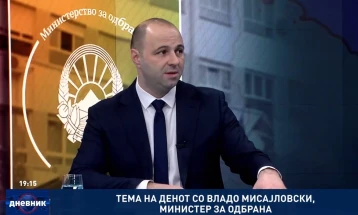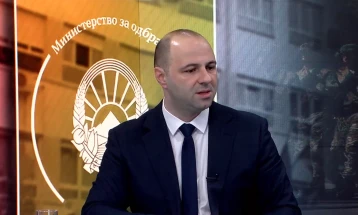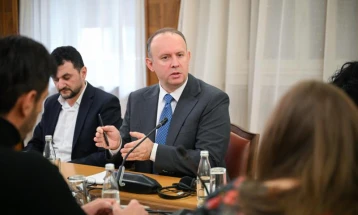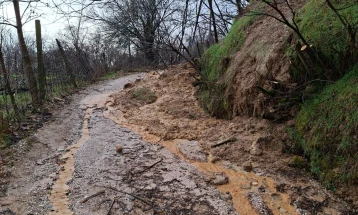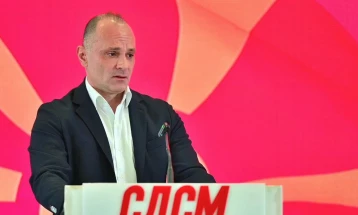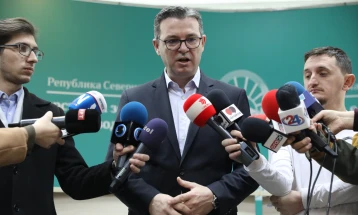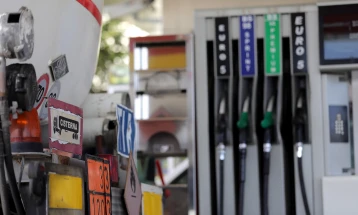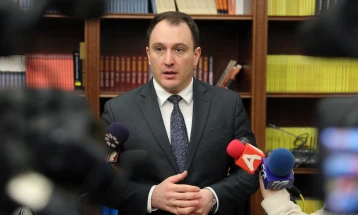Corridor VIII opens European railway routes, benefits common regional security
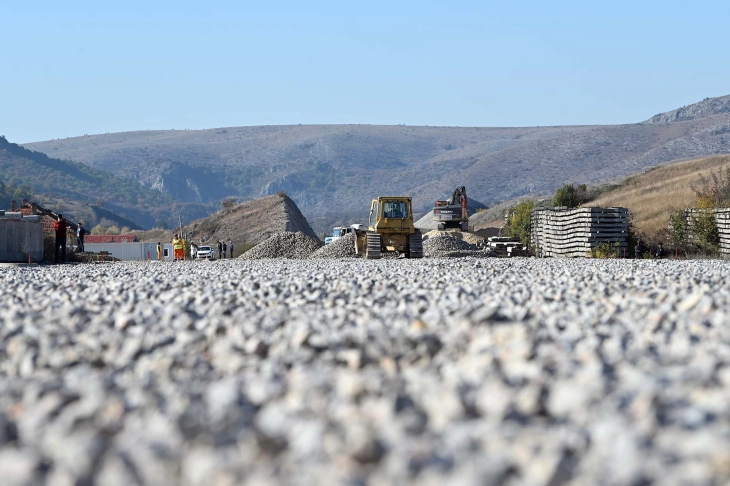
Skopje, 29 October 2022 (MIA) – Rehabilitation and construction works on the Corridor VIII railway section that connects North Macedonia and Bulgaria are becoming a reality. We are building our common future through committed cooperation, ensuring opportunities for the economy, the business community, investing into a functional modern railway links, investing in the regional networking, said Prime Minister Dimitar Kovachevski at the event marking the continued construction of the railway leading to Bulgaria on Saturday.
The event was also attended by First Deputy PM Artan Grubi, Minister of Transport and Communications Blagoj Bochvarski, Railways Infrastructure Director Hari Lokvenec, EU Ambassador David Geer, and European Bank for Reconstruction and Development (EBRD) Head of North Macedonia, Andi Aranitasi.
Construction works include two of the three sections within the 88,2km-long eastern end of railway Corridor VIII (Kumanovo-Beljakovce – 31km, Beljakovce-Kriva Palanka – 34km and Kriva Palanka-Bulgaria border – 24km).
“This investment by North Macedonia opens new European routes for railway transport, establishes regional networking through the ports of Burgas and Varna in Bulgaria and Durres in Albania, which is of exceptional importance for our economy but also for the region in general and its cooperation with other European regions,” said PM Kovachevski.
This economic energy crisis, added the PM, has made it clear how important regional cooperation, networking and goodneighborliness are.
“I expect this long-awaited railway to contribute to accelerated economic development of the country and the region, but also improvement of regional networking and cooperation,” noted Kovachevski.
Bulgarian PM Donev said the construction is important for Bulgaria, North Macedonia and Albania, contributing to the added value in the region’s development.
“Corridor VIII was the wish of many generations on both sides of the border as the key link between the citizens and the business sector,” said PM Donev.
According to him, the Corridor VIII construction that links up the three NATO allies is also in the interest of common regional security and will contribute to an increase in the trade and commodity exchange among countries.
EU Ambassador David Geer said the strategic investment will help promote regional trade, reduce travel times and stimulate sustainable economic growth that will yield benefits for citizens and businesses in the region.
“The initiative will practically help our efforts for goodneighborly relations and the realization of climate goals and pollution. EC and EBRD will invest more than EUR 1 billion in the expansion of the railway from North Macedonia to Bulgaria, and this will be the largest investment of the EU in the country,” noted Geer.
EBRD’s Aranitasi said the railway is one of the bank’s top priorities in the Western Balkans, and such investments will continue in the future.
“EBRD is the largest donor in North Macedonia with investments of more than EUR 1,1 million, but the railway is in our heart, with EUR 250 million already allocated and EUR 100 million more to come for the section from Kriva Palanka to the Bulgaria border, and we will also support the construction of the eastern end from Kichevo,” said Aranitasi.
The EU Delegation to Skopje says the Beljakovce – Kriva Palanka section is the subject of EU assistance provided through the Western Balkans Investment Framework (WBIF). An EU-WBIF funded grant of EUR 75 million, supplemented with EUR 1 million national contribution, is allocated to bring this railway section up to modern standards. The works will be carried out from October 2022 to the end of 2025 and include 5.5 km-long tunnels, railway bridges, over and underpasses, railway stations and halts, as well as a new signalling and telecommunication system.
Additional EU-funded grant of EUR 210 million is in the pipeline for completion of the Eastern end of railway Corridor VIII up to the border with Bulgaria.
Once completed, the railway section is expected to increase the annual freight volume for 20% by 2040 and provide access to modern means of transport to more than 350,000 people. Travel time will be reduced, as well as air and noise pollution.
The construction of first section Kumanovo-Beljakovce will continue after an agreement worth EUR 40,5 million was signed with new contractor “Strabag” this July. “”Gulermak” will work on the second section worth EUR 155 million.
Fifty-four percent of the first section has been built and the rest should be completed by 1-1.5 year, whereas the second should be ready by the end of 2025.
National institutions are planning to complete eastern end of Corridor VIII by 2027, followed by the western end section Kichevo-Lin (Albania) by 2030.
